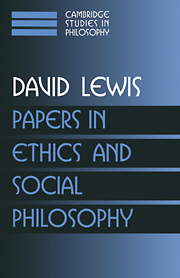Book contents
- Frontmatter
- Contents
- Introduction
- 1 Semantic analyses for dyadic deontic logic
- 2 A problem about permission
- 3 Reply to McMichael
- 4 Why ain'cha rich?
- 5 Desire as belief
- 6 Desire as belief II
- 7 Dispositional theories of value
- 8 The trap's dilemma
- 9 Evil for freedom's sake?
- 10 Do we believe in penal substitution?
- 11 Convention: Reply to Jamieson
- 12 Meaning without use: Reply to Hawthorne
- 13 Illusory innocence?
- 14 Mill and Milquetoast
- 15 Academic appointments: Why ignore the advantage of being right?
- 16 Devil's bargains and the real world
- 17 Buy like a MADman, use like a NUT
- 18 The punishment that leaves something to chance
- 19 Scriven on human unpredictability (with Jane S. Richardson)
- Index
10 - Do we believe in penal substitution?
Published online by Cambridge University Press: 24 December 2009
- Frontmatter
- Contents
- Introduction
- 1 Semantic analyses for dyadic deontic logic
- 2 A problem about permission
- 3 Reply to McMichael
- 4 Why ain'cha rich?
- 5 Desire as belief
- 6 Desire as belief II
- 7 Dispositional theories of value
- 8 The trap's dilemma
- 9 Evil for freedom's sake?
- 10 Do we believe in penal substitution?
- 11 Convention: Reply to Jamieson
- 12 Meaning without use: Reply to Hawthorne
- 13 Illusory innocence?
- 14 Mill and Milquetoast
- 15 Academic appointments: Why ignore the advantage of being right?
- 16 Devil's bargains and the real world
- 17 Buy like a MADman, use like a NUT
- 18 The punishment that leaves something to chance
- 19 Scriven on human unpredictability (with Jane S. Richardson)
- Index
Summary
Imagine that an offender has a devoted and innocent friend. The offender has been justly sentenced to be punished for his offence. But the friend volunteers to be punished in his place. If the friend undergoes the punishment that the offender deserved, does that render it permissible (or even obligatory) to leave the offender unpunished? Is that any reason at all in favour of sparing the offender?
Mostly we think not. It is unheard of that a burglar's devoted friend serves the burglar's prison sentence while the burglar himself goes free; or that a murderer's still-more-devoted friend serves the murderer's death sentence. Yet if ever such a thing happened, we surely would hear of it – for what a newsworthy story it would be! Such things do not happen. And not, I think, because a burglar or a murderer never has a sufficiently devoted friend. Rather, because the friend will know full well that, whatever he might wish, it would be futile to offer himself as a substitute for punishment. The offer would strike the authorities as senseless, and they would decline it out of hand.
Even if the friend managed to substitute himself by stealth, and arranged for it to be found out afterward that he had been punished in place of the offender, the scheme would fail. Once the authorities learned that the offender had gone unpunished, they would get on with the job.
- Type
- Chapter
- Information
- Papers in Ethics and Social Philosophy , pp. 128 - 135Publisher: Cambridge University PressPrint publication year: 1999



